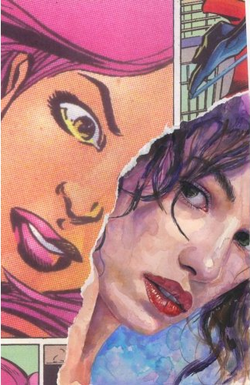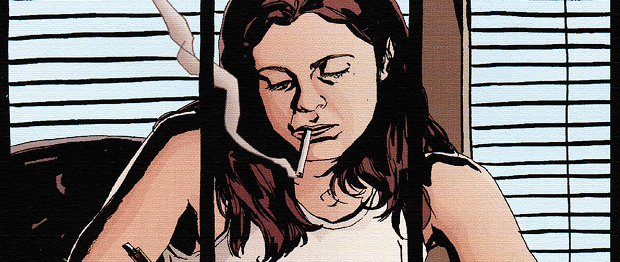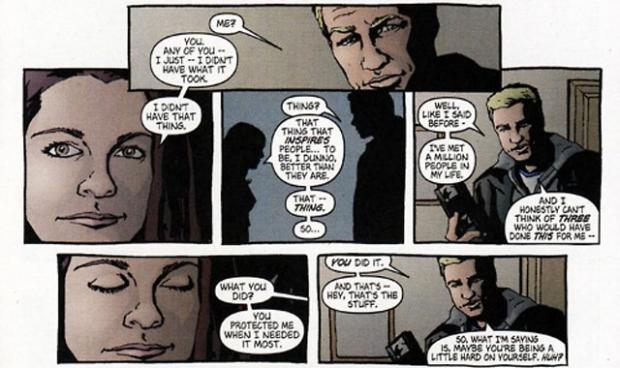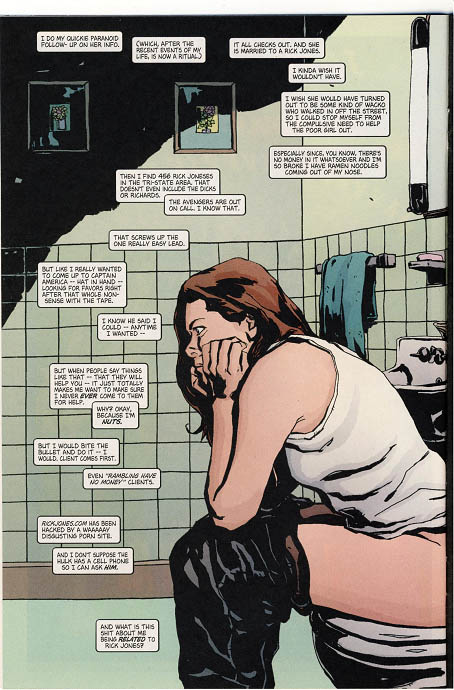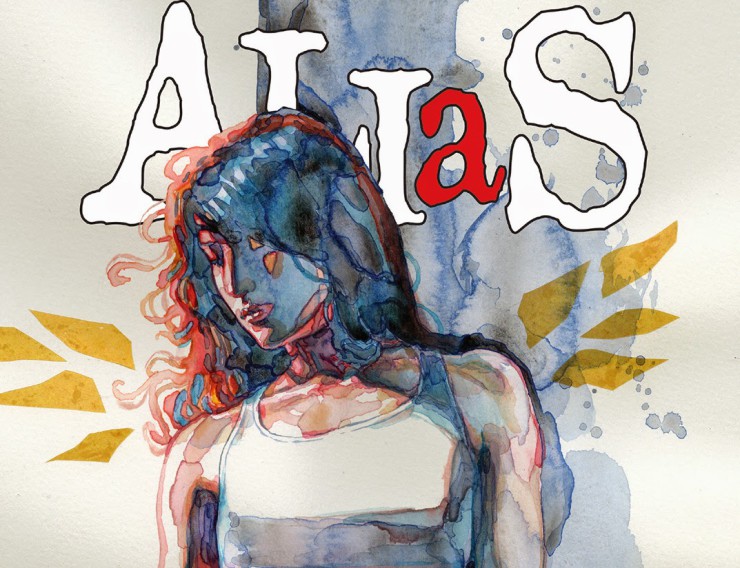Welcome to the Alias reread! In 2001, Marvel Comics introduced their MAX imprint for uncensored, adult comics set in the Marvel universe. They launched with Alias, a comic written by Brian Michael Bendis and drawn by Michael Gaydos, with occasional artistic contributions by Mark Bagley (who was working on Ultimate Spider-Man with Bendis) and extraordinary painted/collage covers by David Mack which helped to give the comic its unique appearance.
Alias introduced us to Jessica Jones, a hard-drinking, hard-living noir detective who used to be a superhero. The book ran for 28 issues and was nominated for two Eisner awards. And on November 20, Jessica Jones will be joining the dark side of the Marvel Cinematic Universe with her own Netflix series, so it’s a great time to revisit her landmark original comic!
I have the fancy recently-released Alias hardcover omnibus, which I highly recommend, but I’ll be breaking them down here by the original 4 trades. You can also access Alias in individual issues at ComiXology.
Vol 1: ALIAS #1-9
Issue #1
JESSICA JONES:
Here’s a couple of little secrets of the private investigating trade. You ready? Firstly, I spend more time verifying that the client is legit than I do finding the person. Secondly, and this is the one I really shouldn’t be giving out, but ok… in the old days, you would have to go to the hall of records or the police station and slip people a couple of bucks, bat your eyes, flirt a little and hope something turned up. But the thing today is—most people—anyone can just hop online and find whoever they want. There’s about a dozen web sites that will do it for you for something like 29.95. Even a monkey can find someone like this. And I know, because as far as the fucking internet goes, I AM a monkey.
The first word of the comic is “Fuck!” which warns you up front what kind of story this is going to be. In her first issue, Jessica Jones deals with an abusive client and an unsympathetic pair of police officers before getting filthy drunk and having what looks like extremely uncomfortable sex with Luke Cage. All this before the real plot begins: a brittle blonde hires Jessica to find her missing sister, and when Jessica follows the lead, she discovers more than she ever wanted to know about the secret sex life of Captain America.
Wait, what?
This isn’t the Marvel Universe we’re used to—and yet, the adult/uncensored content doesn’t feel imposed or gratuitous. Alias tells stories (for the most part) that are set in in a superhero universe, while not belonging to the superhero genre.
One of the downsides of the MAX imprint was the limitation on which licensed characters could or could not appear in one of their titles—which is a shame, because this dark, irreverent comic is at its most interesting when connections ping between Jessica’s grim world and the brighter, more PG version of the Marvel universe. Don’t worry, there will still be plenty of cameos to ping your fangirl radar!
Here in the first issue, we see hints of Jessica’s former life as the superhero Jewel thanks to the snapshots of her in costume, pink-haired and smiling with her arm slung around Carol Danvers/then-Ms Marvel—who will be important later!
Luke Cage also integrates well into Jessica’s seedy side of the Marvel Universe (and it’s clear that Netflix agrees, with his TV series next up in their corner of the MCU: Grimdark Edition). Here at least Luke can properly swear and sound like a badass instead of the usual ‘Sweet Christmas’ dialogue inflicted on him in general Marvel comics.
The shocker is that on the last page of this issue, it looks like Alias is dirtying up the image of Steve Rogers. Or are they?
Michael Gaydos’ dark, shadowy art takes some getting used to—especially his rotoscope-style approach to faces which depicts Jessica in a realistic, sometimes unflattering light—something that feels revolutionary in the portrayal of women in superhero comics. She wears baggy, unglamorous clothes, she scowls a lot, and she’s clearly not posing for anyone’s gaze—unlike the bright, colourful and happy Jewel we see in Jessica’s picture frames.
This is a character who hates herself. But why?
A particular shout out for one double page sequence which heralds a regular feature of the Alias series—a series of narrow panels in which Jessica sits, saying nothing, her blank face repeated at the top of each strip while her client fills the air with infodump, hand gestures and micro-expressions. The use of repetition, silent moments, and massive, over-stuffed blocks of text are characteristic of Bendis comics in general, but Alias in particular—Jessica and her epic bitchface are often at their most powerful when she is listening rather than talking.
Issues #2-#3
JESSICA JONES:
The act of staring at my own curtains for the last twenty minutes trying to decide if they moved because of a breeze or because someone might be in there waiting for me—is an altogether surreal fucking experience.
Jessica Jones has a surveillance videotape she wishes she hadn’t made, her client’s number is suddenly disconnected, the “missing sister” (AKA She Who Is Banging Captain America) has been strangled to death, and when Jessica tries to check in with recent booty call Luke Cage, she finds him at home with his girlfriend.
All this, and the police have been tipped off that Jessica knows something about the dead woman. We saw in Issue #1 that it doesn’t always pay for a super-powered private detective to be honest with the police… now it’s time to show us how bad it is for her to get caught out lying to them.
The second double page of #3 features an epic 34 panels, stacked in slivers across the page, during Jessica’s interrogation. The scene is antagonistic and uncomfortable—the cop taunts her to prove what she can do and/or say something she shouldn’t, and Jessica struggles to not to be seen as a threat.
Turns out, trying to convince the police that you’ve been set up is a great way to make them suspect you are a murderer.
There’s a ‘bottle episode’ feel about the intense and sinister interrogation, which covers half the issue and only ends when attorney Matt Murdock turns up out of nowhere to rescue Jessica. The second half of the issue is brighter, with the borders in white instead of black, deliberately presenting a surreal ‘walking around in daylight’ atmosphere after so long in that dark, shadowy cell.
Matt Murdock, of course, is Daredevil, though the cute twist here is that Jessica doesn’t know his secret identity, so he pretends he’s there on Luke Cage’s behalf rather than because he—or, rather, Daredevil—was Jessica’s colleague back in the day.
Matt isn’t the only super guest star in this issue—we also get Carol Danvers (Ms Marvel, these days known as Captain Marvel), who we know from Jessica’s pictures was a special friend of Jewel.
Today, Carol is flu-ridden, on her period, and highly antagonistic. She hasn’t forgiven Jessica for past behaviour, and she flat out refuses to help her get in touch with Captain America. (The Avengers are away on a world-saving crisis and Carol stayed home because flu and also, cramps). She reluctantly agrees to a lesser favour—tracing the number that Jessica was given for her client before it was disconnected and the client’s “missing sister” was strangled.
The number, it turns out, belongs to a presidential campaign.
What?
Issues #4-#5
THE BAD GUY:
Well, Ms Jones… it seems I was given some very inaccurate information on you. I guess this is a compliment—but it seems you aren’t nearly the angry, drunk, down-on-her-luck, loser ex-super hero, looking out only for herself, bitch I was led to believe.
Who is this Keaton for President fellow? Jessica has no idea except that his policy on superheroes is: “they are dangerous, we can’t trust them.” I see what you’re doing there, shadowy forces.
Using actual detective work, Jess stakes out the campaign office, and follows a trail including the blonde who originally hired her, and a panicky lawyer. She gets a call from Matt Murdock to let her know that she’s officially no longer a suspect in the murder case. The bad news… well, the bruising on the victim’s neck suggests a large man with big hands. (Big like Captain America big?)
Jessica is promptly jumped by a thug who informs her that being work-for-hire means after he’s done beating her up, he gets to do anything he likes with her lifeless body. Too bad for him, she has super strength and can literally hit him all day if she wants to.
She kinda wants to.
The next clue leads to a golf course, and the real villain of the piece, a political fixer who expected Jessica to take the money—that is, to use her dynamite videotape implying Captain America’s involvement in a sex scandal/murder and convert it into a dollarific media frenzy. Which would sure help his anti-superhero presidential candidate.
The fixer didn’t bank on Jessica being a decent human being. He threatens to have her publicly destroyed in the media, and killed in her sleep. But as it turns out, SHIELD has been on top of this sad little story from the start. Jessica gets a phone call from old friend Agent Clay Quartermain, giving her some firm advice. Helicopters are sent, and Keaton For President is brought down behind the scenes.
Cut to Jessica, hunting through her clothes to destroy SHIELD’s surveillance bugs, when Steve Rogers knocks on her door to collect a certain tape. Their conversation is awkward (it’s clear he barely remembers her from her superhero days) but sweet. In protecting the tape, Jessica did something that Captain America himself thinks is heroic. Aww.
He stops short of offering his friendship, hinting that she needs to fix the friendship she has with Carol instead. He’s not wrong.
This take on Steve Rogers—a man out of time, desperately lonely and failing at every turn to make lasting human connections in the modern world—feels unusual to me because I’ve been reading the Ed Brubaker run on the characters which began a few years later, covering to the return of Bucky Barnes as the Winter Soldier. I’m used to a much more up-to-date and emotionally stable Steve Rogers, surrounded by loving friends and honorary family in SHIELD and the Avengers.
Perhaps Jessica caught him on a bad day.
Issue #6
JESSICA JONES:
Hey, Carol, listen, I never went “Farrah.”
CAROL DANVERS:
But you were totally “Flashdance.”
JESSICA JONES:
Fuck Jennifer Beals and what she did to my youth.
Carol Danvers and Jessica Jones do lunch, and it’s amazing. They drink wine, gossip about boys, and snark about the fashion mistakes they made back in the day. My favourite part is where Carol describes Luke Cage as a “cape-chaser” and lists all the superheroines he’s had sexytimes with. It’s a long list!
Carol also tries to set Jessica up with Scott Lang, and Jess refuses on the grounds that, well, he’s Ant-Man.
JESSICA JONES:
In fact, I think I’d rather stay out of the genetically-altered pool altogether.
Do you think she’d change her mind if she knew he was gonna end up played by Paul Rudd?
The prickly, on again off again friendship-of-former-colleagues between Jess and Carol is one of the most important relationships in this comic. Because the Captain Marvel movie is still distantly on the horizon (and getting further away, damn it), we won’t have this in the Netflix series, though the casting of Patsy/Trish Walker AKA Hellcat suggests a similar friendship will take its place. I certainly hope so!
In a typical Bendis-Gaydos study of contrasts, we lurch from this cheerful and life-affirming lunch into a series of aggressive, sexually explicit chatroom messages between Jessica (under a male handle) and the husband of a client. She’s interrupted in her gay cybersex shenanigans by a seventeen-year-old fanboy who breaks into Jess’s office because he wants to be her sidekick.
Jessica’s surreal day is capped off when Mrs Jane Jones arrives in tears because her husband—Jessica’s relative, Rick Jones—is missing. Cue the second major story arc! If you’re wondering what the theme is, the clue was in the “cape-chaser” conversation.
Issues #7-#9
“Thank you for calling Avengers Mansion Emergency Hotline. The number you have reached is for emergencies only.”
Rick Jones, for those of you not immersed in obscure Marvel lore, was the ultimate sidekick back in the day. He’s particularly associated with the Hulk (he was the kid Bruce Banner was trying to save when he got his gamma ray superpower upgrade) but he also helped to bring the Avengers together, and sidekicked for Captain America (as fake Bucky!).
I was a DC girl before I got into Marvel comics, so my first take on this was—so he’s Snapper Carr, yeah? The ordinary boy who’s lucky enough to play with the superheroes and be super special and totally relatable for those BoyReaders at home? That guy.
Huh, I never knew Rick and Jessica Jones were related. But guess what? Neither did she!
The more Jane Jones talks (and talks and talks, in another classic ‘Jess listens to her client’ strip-repeat panel layout) the hinkier this gets. (The first time I read this I had no idea who Rick Jones was, so the story sounded extra fake).
Jane has been married for six months and she adores her husband, the special snowflake living legend. Hey, he stopped the Kree-Skrull war, he’s best friends with all the superheroes. He’s the bomb! (He plays the guitar)
There’s nothing in this case for Jessica, as Jane can’t afford to pay her, but she can’t leave it alone.
After thinking on the toilet (the unglamour of Jessica Jones is perhaps best summed up by this single panel), fighting with her mother on the phone and buying Rick’s book Sidekick, Jessica tracks the man himself down via the park where he hangs out trying to impress teenagers, the club where he regularly does his acoustic guitar set, and a dark alley.
Rick is panicked and paranoid, babbling about Skrulls trying to kill him (in the Marvel Universe, not unrealistic). Jessica tries to get him some official help, but when they try to get in contact with Reed Richards of the Fantastic Four, they are turned away by the receptionist. Rick finally cuts and runs.
One of the main themes of Alias is Jessica’s isolation from her former colleagues. She saved Captain America’s reputation, but she doesn’t have his private cellphone number. (She has Carol’s, but she’s not picking up)
Jessica ends up blurting out the whole Rick Jones saga over an answerphone service, only to be politely informed later (by Iron Man’s butler Jarvis) that the real Rick Jones is across the country, safe and well. Jessica Jones has been conned—and it has never been more obvious that she’s not in the inner circle of superhero buddies.
She later finds “Rick” in the park, reunited with his grateful wife, and still committed to his delusions.
Depressed and humiliated, Jessica moves on to her other job for the day—catching out the cheating chatroom husband. She ends up unloading her drama on a psychotherapist in Starbucks who remote-diagnoses “Rick” with Pseudologica Fantastica—i.e. people want to appear to be connected to famous people because it’s exciting.
After sending the psychotherapist away with a warning that he needs to talk honestly with his wife, Jessica recalls a deeply embarrassing (in retrospect) scene with Rick in the same Starbucks earlier that day.
Reading Rick Jones’ book had a profound impact on Jessica—and she earnestly confessed her feelings about it to the man she thought was the author. This is the most honest and open we’ve ever seen our protagonist—she describes the physical reaction of being around superheroes, the desperate longing to be part of that world, and the sadness of knowing she wasn’t good enough.
“Rick,” of course, sat there and let her talk.
This scene is a gorgeous example of how versatile the graphic novel format can be—not only with the lighting and colour shading that makes it clear which parts are flashback and which are the present, but the art also shows the shifty expressions on Rick’s face, which Jessica can recognise now she knows the truth.
The final page is a beautiful thing—the dull blue of the flashback sequence bleeding into the bright yellow of the ‘now’ and Jessica Jones thoroughly fed up with herself as she observes her gullible (slightly) younger self, at peace and happy for the first time in nine issues.
JESSICA JONES:
“The peasants want the kings to come down and play.” Fuck.
Tansy Rayner Roberts is a Marvel Comics tragic, and a Hugo Award winning blogger and podcaster. Tansy’s latest piece of published short fiction is“Fake Geek Girl” at the Review of Australian Fiction, and she writes comics reviews on her own blog. You can find TansyRR on Twitter & Tumblr, sign up for her Author Newsletter, and listen to her on Galactic Suburbia or the Verity! podcast.










